On analogical arguments: Organizing logical and conceptual problems in sections 18 and 19 of Schopenhauer´s The World as Will and Representation
DOI:
https://doi.org/10.5902/2179378634129Keywords:
Analogical arguments, Solipsism, Thing in itselfAbstract
Here I list and organize some logical and conceptual problems in Section 18 (about the cognoscibility of the thing in itself) and Section 19 (about the extension of this result to the world) in Schopenhauer´s main work. When Schopenhauer put out the analogical argument for the responsibility for transmitting (übertragen) the problematic identification thing in itself/will, he brought to his philosophy the following fragile points of such an argument: (i) the logical invalidity; (ii) the lack of criterion for the extension scope; (iii) the indeterminacy of what is really being extended; (iv) the unrestricted character of his analogical extension; (v) the indirect nature of his argument (for avoiding the solipsism); and (vi) the collapse of what is being extended. I then try to point out why - despite these logical fragile points - the analogical argument seems not to be problematic at all to Schopenhauer.Downloads
References
BRANQUINHO, João (et al.). Enciclopédia de termos lógico-filosóficos. São Paulo: Martins Fontes, 2006.
CACCIOLA, Maria Lúcia. Schopenhauer e a questão do dogmatismo. São Paulo: EdUSP, 1994.
JANAWAY, Christopher (Org.). The Cambridge Companion to Schopenhauer. England: Cambridge University Press, 1999.
KANT, Immanuel. Kritik der reinen Vernunft. 2 Bände. Frankfurt am Main: Suhrkamp Taschenbuch, 1974.
SCHOPENHAUER, Arthur. Die Welt als Wille und Vorstellung. Herausgegeben von Werner Brede in zwei Werke. München: Carl Hanser Verlag 1977.
SCHOPENHAUER, Arthur. O mundo como vontade e como representação. Tradução, apresentação, notas e índices de Jair Barboza. São Paulo: Editora UNESP, 2005.
SCHOPENHAUER, Arthur. The World as Will and Representation. Trad. EFJ Payne. New York: Dover Publications, Inc, 1966.
SCHOPENHAUER, Arthur. Sobre o Fundamento da Moral. Trad. Maria Lúcia Cacciola com ensaio introdutório de Alain Roger. São Paulo: Martins Fontes, 1995.
ROGER, Alain. Ensaio introdutório. In: Sobre o fundamento da moral. São Paulo: Martins Fontes, 1995.
SPIERLING, Volker. Arthur Schopenhauer zur Einführung. Hamburg: Junius Verlag, 2002.
SPIERLING, Volker. Kleines Schopenhauer Lexikon. Stuttgart: Reclam, 2003.
TORRES FILHO, Rubens. Prefácio. In: Schopenhauer e a questão do dogmatismo. São Paulo: EdUSP, 1994.
WITTGENSTEIN, Ludwig. Tractatus Logico-Philosophicus. Trad. Luiz Henrique dos Santos. São Paulo: EdUSP, 1992.
Downloads
Published
How to Cite
Issue
Section
License
The submission of original manuscripts to this journal implies the transference, by the authors, of the copyrights for printed and digital publication. The copyrights of a published manuscript belong ultimately to the author, and only the copyright for its first publication is reserved to the journal. Authors may only use the same results in other publications explicitly indicating this journal as the medium of the original publication.
Licence
Attribution-NonCommercial-ShareAlike 4.0 International (CC BY-NC-SA 4.0) - This license lets others remix, tweak, and build upon your work non-commercially, as long as they credit you and license their new creations under the identical terms.






